Except Me: an exhibition aiming to help stop violence towards women (Nagwa Bakr, Egypt, ITP 2019)
Written by Nagwa Bakr, Community Exhibition Officer, Ministry of Tourism & Antiquities, (Egypt, ITP 2019)

Within the 16-day campaign to combat violence against women, an art exhibition and event were organised in cooperation between Cultural Development and Community Engagement Department and The Baron Empain Palace under the title “Except Me“. It was hosted in the historic house “Bayt AlSinnari” – Library of Alexandria in Cairo
The 16-days campaign is a global campaign marked annually by the United Nations. Within its framework and at the national level, a set of activities are implemented in all governorates of the Egyptian Republic bearing the same name “16 Days of Activities against Gender-Based Violence Campaign”, with the aim of raising general societal awareness of forms of violence against women and the importance of eliminating it. The activities are carried out every year from November 25, International Day for the Elimination of Violence against Women, and continue until December 10, International Human Rights Day.
The exhibition is considered the first of its kind to be organised by the Ministry of Tourism and Antiquities. It sheds light on a general societal issue in Egyptian society that deals with the various types of violence that women suffer from, especially since the year 2022 witnessed many murders of girls in public places, in addition to verbal and physical harassment that we are exposed to as women daily.
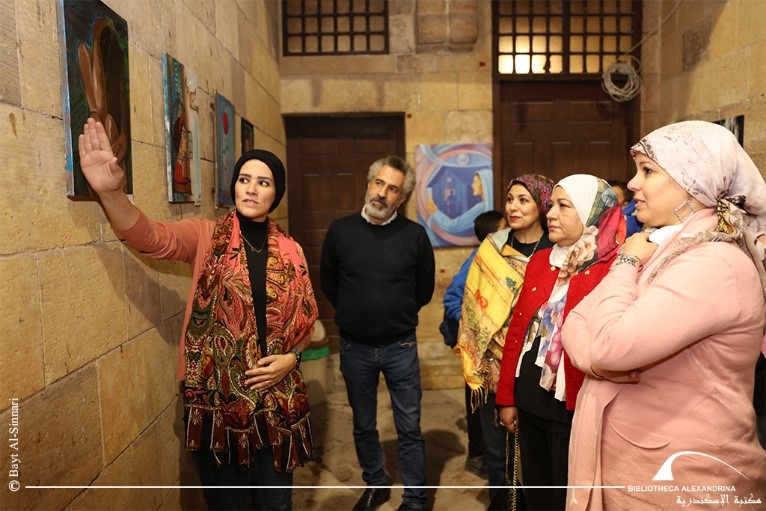
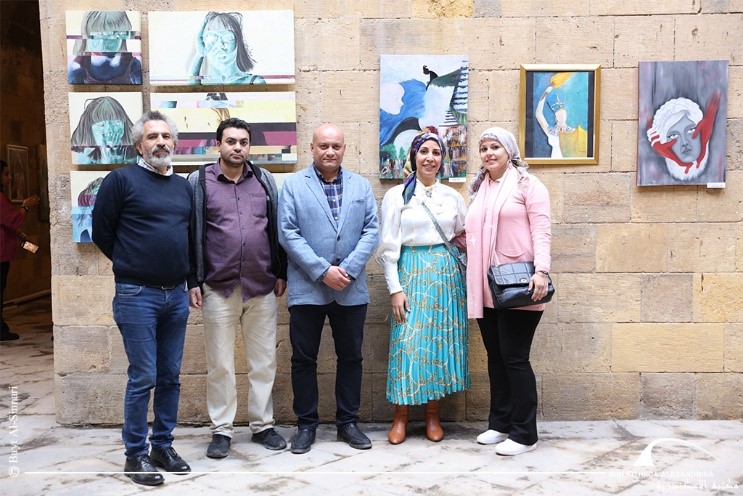
We thought that it was necessary for museums to pay attention to such a dangerous issue against women and how they could contribute through exhibitions and various activities in dealing with these issues, especially through art. How can museums and heritage sites contribute to the treatment of violence also through art exhibitions and through specialised psychological programmes designed by specialists in psychology and psychiatry, how do we encourage women to talk without fear about what they suffer from.
For many years, for women to speak out that they have been harassed in the street, or to stand up against the harasser is considered a kind of shame for them. Directly and without thinking, women were blamed for being the cause, in addition to our eastern traditions, which consider talking about such matters as a disgrace to women and reflecting that they are immoral. For years, women have been suppressed in the name of tradition and fear. Then, the drama since 2020 was the first to address these issues and encourage women, as well as various campaigns in recent years launched by the National Council for Women to show solidarity with women and encourage reporting against types of violence and assistance to survivors of violence of all kinds, campaigns against harassment. Finally, we, as specialists in museums and community issues, encouraged us to address this complex subject in a society with different traditions.
45 artists, most of them women, participated in the exhibition, and it was distinguished by the participation of one man, who had an important role in knowing men’s vision of violence, and whether they really know what women suffer from, and his assertion that it was necessary to encourage other men to participate more to understand women’s issues and support them.


Some distinguish artworks
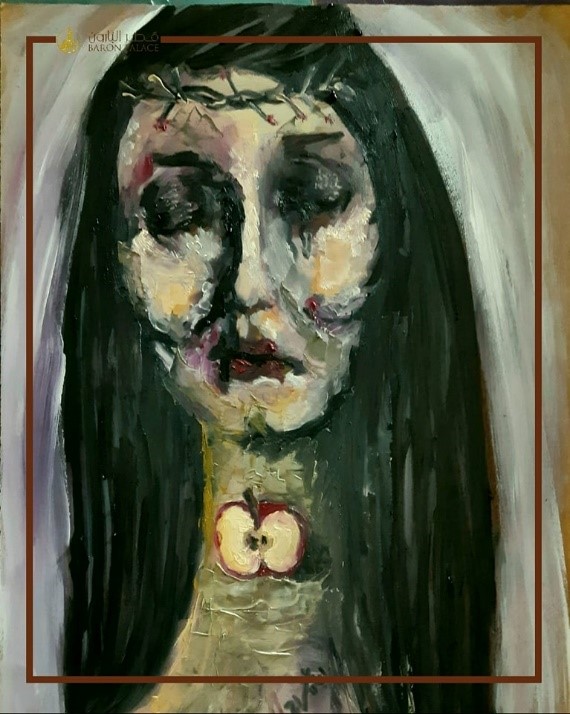
Iman Ezz: The dream of every girl is to wear a wedding gown, a crown of roses, and a white veil, but she may be afflicted by a husband who does not respect and does not know the meaning of marriage. Her dream turns into a nightmare, because of his mistreatment and the treatment of his family. As a divorcee to complete her life and bear the burden of which she may be innocent. Women are still concerned about their marital status, such as the divorced woman and the stigma attached to her in society, as well as the unmarried woman and the pressures and hurtful words they suffer from.

Asmaa Adel: The woman shares with the lion that she is the queen of the universe, characterised by courage, strength, and challenge. She can overcome the difficulties that surround her, which are symbolised within the circle by the hot colours that surround her and restrict her in the name of customs and traditions. She wants to be freed from all this and get out of this circle with the wing on the right side to remain in peace and quiet so that she can continue and remain tall, strong, capable of giving and challenging.
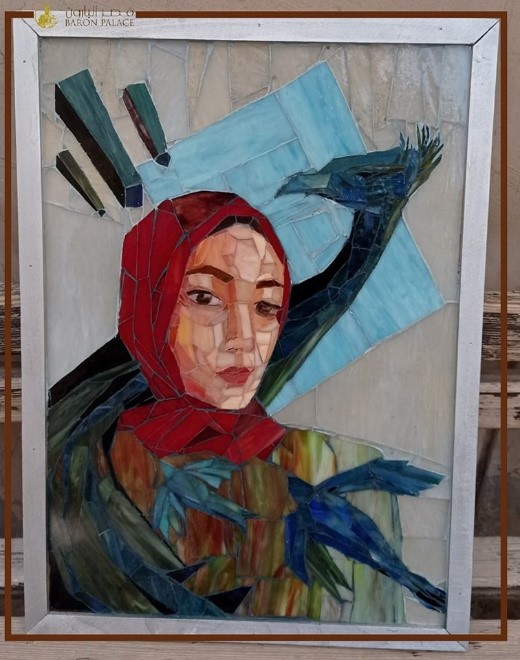
Aya Ahmed Pasha: A phoenix whose wings spread around my world to liberate me from the restrictions imposed on my society, to feel the sunshine in my atoms and to be born again, to fly with my horizons in a sky full of security and peace. I am the one who always wished to get the appreciation I deserve and the security I wait for. My heart is like that of a soft, gentle bird that deserves a home like it.
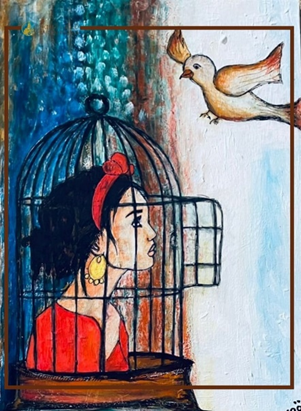
Marwa Fouad: The restrictions women face in the countryside, such as depriving them of education and early marriage. She looks at the bird with a sad look, wishing to be free like him.
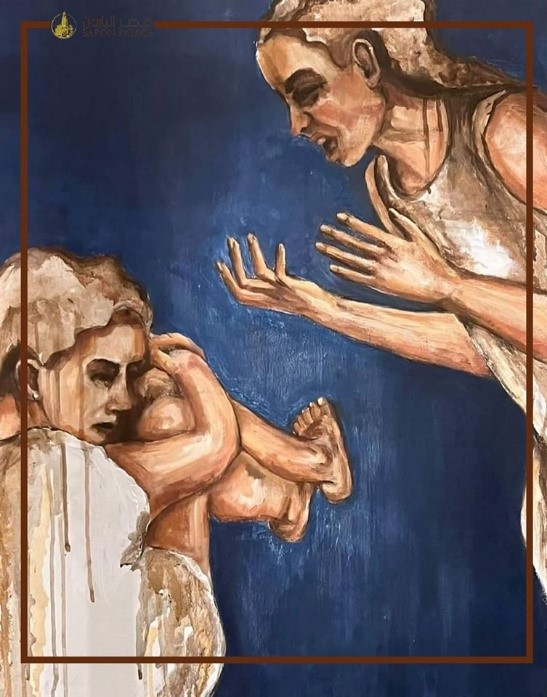
Asmaa Abu Warda: The abused woman is originally a child who was exposed to domestic violence, repression, and fear, and that is why she has feelings of fear, weakness, and mistrust. When she grows up or gets married, she always attracts people who abuse her, and even completes the circle by becoming a mother who practices violence on her children. It is important that we break this cycle and have sufficient awareness of the importance of building a strong girl and woman with a healthy self. A balanced female who is aware of her self-worth.

Hala Salah Al-Husari: although, pressures and various types of violence that a part of society practices against women, she always looks forward to her freedom and clings to hope.
Other activities which took place alongside the exhibition
A seminar for the public on “Women’s Literature: A View on Dramatic and Narrative Works and Their Relationship to Women.” It was a panel discussion between Dr. Sherif Shaaban and Mrs. Sherine Sami, writer and novelist in the literature of Egypt. Most of her works deal with women and their issues, feminist literature, the image of women in Egyptian drama and how drama played a major role during the seventies in changing the image of women and changing many personal status laws in favour of women. Then the regression that women suffered in dramas during the period 2011 to 2015, then how did dramas return with courage to stop violence against women and encourage women to talk publicly about violence and stop the words of shame for battered women and the accusations that they are the reason for what they are exposed to.

A seminar entitled “Respect of Women in Ancient Egypt”. It was delivered by Dr. Mamdouh Farouk – Director of the Imhotep Museum in Saqqara, during which he dealt with the status that distinguished women in ancient Egypt, their rights and duties, and dealt with the characteristics of Egyptian society and the stability and mutual respect that characterised it among all its members.
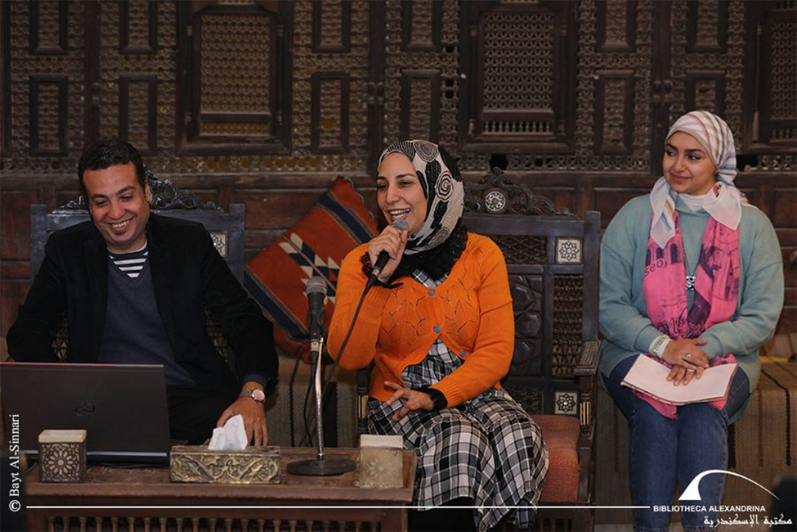
Dr. Safinaz Al-Maghazi: Consultant Psychiatrist, who was the guest of honour at the exhibition. She has been cooperating with us on a voluntary basis for more than two years in designing and presenting many support programmes for the elderly and young girls. Finally, she cooperated in the “Except Me” activities by presenting a session on women, post-violence recovery and self-love.
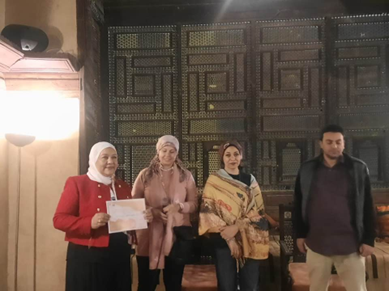
Finally, all thanks to The Baron Empain Palace team for the unique exhibition idea and cooperation in producing this exhibition. Deep thanks to my friend Dr. Basma Selem, Director of The Baron Empain Palace, for her successful cooperation in many events and for her different ideas to deal with societal issues. Many thanks “Bayt.AlSinnari, Alexandria Library, for coordinating the exhibition.
